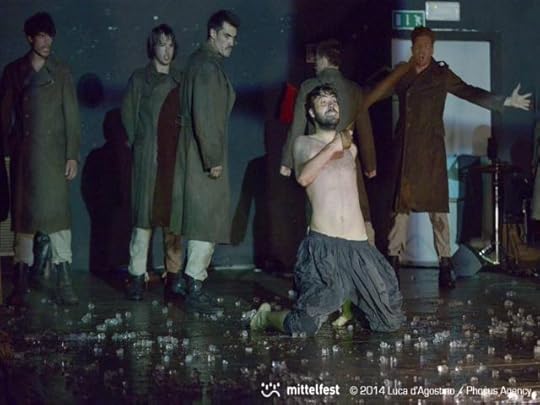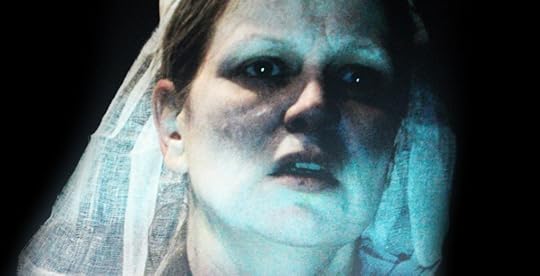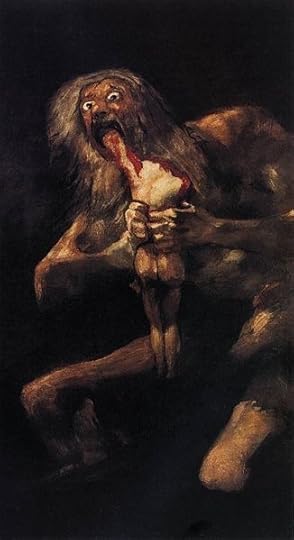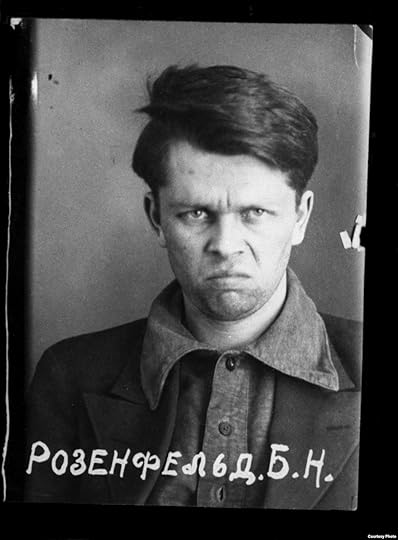What do you think?
Rate this book


136 pages, Paperback
First published January 1, 1976
Novsky was already a man of failing health; the dog years of hard labor and revolutionary zeal, which feeds on blood and glands, had weakened his lungs, kidneys, and joints. His body was now covered with boils, which would burst under the blows of rubber truncheons, oozing out his precious blood along with useless pus. Nevertheless, it seems that in contact with the stone of his living tomb, Novsky drew some metaphysical conclusions undoubtedly not much different from those suggesting the thought that man is only a speck of dust in the ocean of timelessness…







The next night, that of January 29-30, the scene was repeated: the guards led Novsky down the vertiginous spiral stairs into the deep cellars of the prison. Novsky realised with horror that this repetition was not accidental, but part of an infernal plan: each day of his life would be paid for with the life of another man; the perfection of his biography would be destroyed, his life’s work (his life) deformed by these final pages.
It wasn’t the silks that brought blood to their eyes, but the books arranged on my shelves; they shoved the silks under their cloaks, but they threw the books on the floor, stamped on them, and ripped them to threads before my eyes. Those books were bound in leather, marked with numbers, and written by learned men; in them, had they wanted to read them, they could have found thousands of reasons why they should have killed me at once, and in them, had they wanted to read them, they could have also found the balm and cure for their hatred.
I told them not to rip them apart, for many books are not dangerous, only one is dangerous; I told them not to tear them apart, for the reading of many books brings wisdom, and the reading of one brings ignorance armed with rage and hatred.
"Those books were bound in leather, marked with numbers, and written by learned men; in them, had they wanted to read them, they could have found thousands of reasons why they should have killed me at once, and in them, had they wanted to read them, they could also have found the balm and cure for their hatred. I told them not to rip them apart, for many books are not dangerous, only one is dangerous; I told them not to tear them apart, for the reading of many books brings wisdom, and the reading of one brings ignorance armed with rage and hatred. (113-114)After beginning on a somewhat troubling and troublesome note (I cannot stand depictions of animal cruelty, no matter what kind of higher moral-aesthetic purpose it may serve—it elicits an immediate and visceral no response), the stories that make up A Tomb for Boris Davidovich turned out to be hauntingly memorable. Kiš could write; his words are very carefully selected and his prose is close to poetry but never overdone. I particularly appreciated his use of biography to tell his tales, which are brutal and reminiscent of Shalamov, Koestler, Solzhenitsyn, and other great portrayers of dark times—yet remain unique.
“In light of the approach of counterrevolutionary bands toward the Red capital of the Urals and the possibility of the crowned executioner escaping trial by the people (a plot among the White Guards to try to abduct him and his family was exposed and the compromising documents will be published), the Presidium of the Ural Regional Soviet, fulfilling the will of the Revolution, resolved to shoot the former Tsar, Nikolai Romanov, who is guilty of countless, bloody, violent acts against the Russian people.” – An announcement from the Presidium of the Ural Regional Soviet of the Workers’ and Peasants’ Government.
“I wish to live in peace with myself and not with the world.”

“I have outlived three generations of brave men, mistaken as they may have been, to whom I was deeply attached, and whose memory remains dear to me. And here again, I have discovered that it is nearly impossible to live a life devoted wholly to a cause which one believes to be just; a life, that is, where one refuses to separate thought from daily action. The young French and Belgian rebels of my twenties have all perished; my syndicalist comrades of Barcelona in 1917 were nearly all massacred; my comrades and friends of the Russian Revolution are probably all dead — any exceptions are only by a miracle. All were brave, all sought a principle of life nobler and juster than that of surrender to the bourgeois order; except perhaps for certain young men, disillusioned and crushed before their consciousness had crystallized, all were engaged in movements for progress. I must confess that the feeling of having so many dead men at my back, many of them my betters in energy, talent, and historical character, has often overwhelmed me; and that this feeling has been for me also the source of a certain courage, if that is the right word for it.”
As he plunged his short Bukovina knife with the rosewood handle into her breast, Miksha, sweaty and gasping, could barely make out a word or two from the quivering, muffled, choking onrush of syllables that reached him through the slush, blood, and screams. His stabs were quick now, inflicted with a self-righteous hate which gave his arm impetus. Through the clacking of the train wheels and the muffled thunder of the iron trestle, the girl began, before the death rattle, to speak-in Romanian, in Polish, in Ukrainian, in Yiddish, as if her death were only the consequence of some great and fatal misunderstanding rooted in the Babylonian confusion of languages.